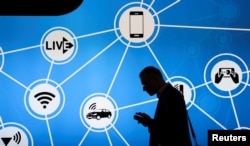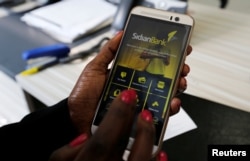We are in the midst of a mobile tech revolution that promises to change the way we live, say industry experts at this week's Mobile World Congress (MWC) in Barcelona, Spain, where the ‘Internet of Things’ and superfast 5G technologies are all the rage. But even the most basic mobile technology is changing lives in some of the world's most remote parts.
The exhibit is a showcase of the latest technology — and a glimpse of what the future holds. And industry insiders at the MWC 2017 say there is a lot more to come.
Pibo, for example, is a mobile-connected robot designed to help families connect and express their emotions in the digital age. On the other hand, they could invest in a digital hang drum — a traditional instrument used in yoga, updated for the 21st century so it syncs with your smartphone.
U.S. technology giants AT&T and General Electric have come up with smart street lamps, with cameras, sensors and microphones connected to 4G mobile networks. Over three thousand are being installed in the western U.S. city of San Diego, California and will be used for traffic analysis.
But AT&T product manager Trey Winter, said the makers have bigger ambitions.
“You are going to be able to detect smart parking solutions, gunshot detections inside of a city infrastructure. Environmental features detecting weather, smog, pollution," he said. "Really bringing to life the intelligence inside of the city.“
5G networks
Much of the buzz at this year’s show is around super-fast 5G networks — with faster download speeds and almost zero delay.
Roger Chen of CNET magazine explained that this means a "real-time connection."
"The best example someone has given to me is a surgeon performing a surgery in one country with robotic hands in another country," he added.
Apps offer solutions for Africa
Mobile technology is transforming the economies of many African countries, with smartphone apps ranging from herding cattle in Kenya and connecting dirty laundry to mobile washerwomen in Uganda.
Eneza, for one, uses basic mobile technology to offer access to a huge range of education. Two million students are signed up to its ‘virtual classroom‘ — and the better their grades, the more mobile airtime the parents receive.
The company's chairman, Stephen Haggard said "they are able to access all the education they want for a subscription that’s about 10 U.S. cents per week."
"That covers the full curriculum and will get them everything they need to do from around age eight to finishing school," he said. "The reality in most of Africa is that mobile technology is actually the only way that you can reach huge numbers of people at low cost with any kind of content.”
A recent report by consultants McKinsey predicted that by 2025 half of sub-Saharan Africa’s billion strong population will have internet access, over two-thirds via smartphones.







